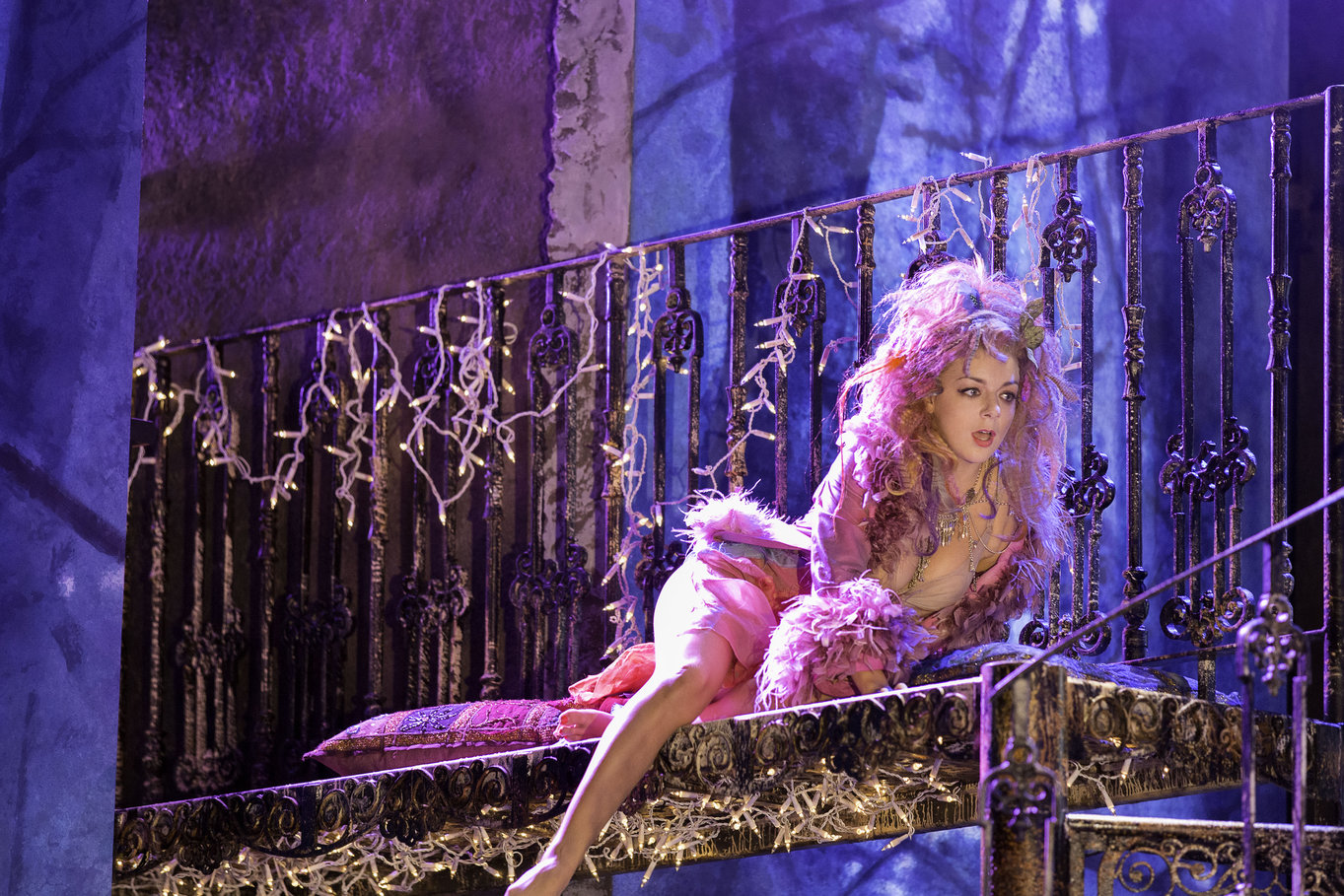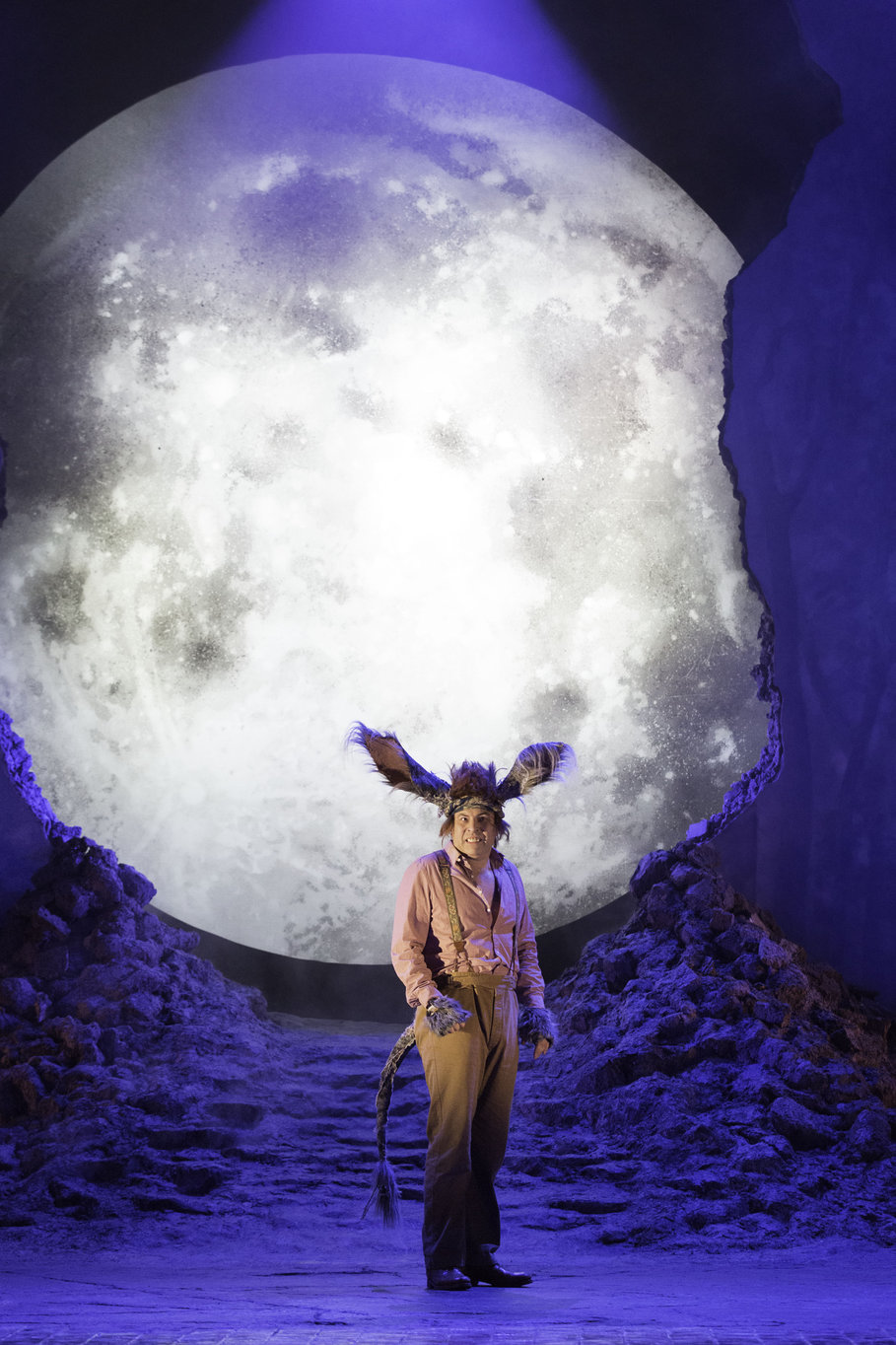It’s a nothing of a line – “Hail mortal” – spoken by nobody important, but in Michael Grandage’s A Midsummer Night’s Dream it becomes the basis for an entire concept. A trivial bit of linguistic sleight of hand turns it into “Inhale mortal” and there you have it, a fairy troupe high on waccy baccy and the most sexually and socially anarchic of Shakespeare’s comedies transformed into the toothless fantasy of a bunch of New Age stoners. It’s magic alright, but of the clumsiest kind.
Christopher Oram’s designs and costumes set us temporally adrift, slipping between a quasi-1940s Athens and a hippy commune of fairies soundtracked to The Mamas and the Papas. An oversized moon bursting in through the backdrop speaks loudly of madness, just in case Titania’s orgiastic followers (a mixture of Barrie’s Lost Boys and the more enthusiastic devotees at a Lady Gaga concert) didn’t adequately convey it. The Mechanicals, by contrast, are quite the most dapper and polished bunch imaginable, but not so busy camping it all up that they don’t have time to tie a natty knot in a cravat or achieve the perfect side-parting.
Walliams sprawls all over the tight comedy of the rustic scenes with careless charisma
According to the posters this is a show all about David Walliams and Sheridan Smith, and the production doesn’t do much to contradict this. Walliams is a predictably enthusiastic Bottom, sprawling all over the tight comedy of the rustic scenes with careless charisma. It’s a shame that he values Shakespeare’s textual comedy so little, because his familiar gay routine from Little Britain doesn’t have quite have the breadth to plug the holes where all the jokes are missing. Some pleasing by-play with Richard Dempsey’s adorable Peter Quince aside, Walliams throws off the weighting of his scenes, denying Craig Vye’s Snug and Henry Everett’s Snout much of a comic voice in proceedings.
 Smith’s more generous approach to her ensemble scenes works well however, and in her hands Titania (pictured left) becomes an altogether lustier, warmer creature than usual (though her Hippolyta is no less of a cipher). What a shame then that in Pádraic Delaney she has such a limp Oberon.
Smith’s more generous approach to her ensemble scenes works well however, and in her hands Titania (pictured left) becomes an altogether lustier, warmer creature than usual (though her Hippolyta is no less of a cipher). What a shame then that in Pádraic Delaney she has such a limp Oberon.
Landing on the rhymes with all the force of a second-rate corps de ballet, Delaney leaves little comedy for the rustic couplets of Pyramus and Thisbe, having wrung all the poetry from his already. “I know a bank” attempts tonal transformation and achieves only a jolting grind of gears, while elsewhere the ruthless pace of dialogue leaves him barely coherent. The overall effect of this high-speed production (short as any Shakespeare you’ll see on stage this year) is of a verbal gunfight among amateurs. Comic targets are often missed, but in the chaos the ricocheting bullets do occasionally strike humour from an unexpected angle.
 Fortunately Grandage has a bright young quartet of lovers to redeem things. Their physical clowning is the evening at its most naturally funny, with Katherine Kingsley’s baleful Helena as the star. Stefano Braschi manages to make something human of dud role Demetrius, sparring gleefully (and nakedly) with Sam Swainsbury’s Lysander as though back in the boarding-school changing rooms.
Fortunately Grandage has a bright young quartet of lovers to redeem things. Their physical clowning is the evening at its most naturally funny, with Katherine Kingsley’s baleful Helena as the star. Stefano Braschi manages to make something human of dud role Demetrius, sparring gleefully (and nakedly) with Sam Swainsbury’s Lysander as though back in the boarding-school changing rooms.
It’s odd that with two major comic actors leading a cast that laughs should be at issue in this production, but it’s still odder that in Grandage’s veteran hands the sense of the play should be so muddy. There’s no commitment to anything beyond the action of the moment, leaving questions such as the relationship between the Athenian royals and their fairy counterparts and the nature of the partnership between Oberon and Titania unaddressed. There’s little magic in this fairyland – certainly no dark, dangerous magic from Gavin Fowler’s Puck – but still less reality, and it’s this latter that condemns the show to be a competent West End romp and little more.















Add comment